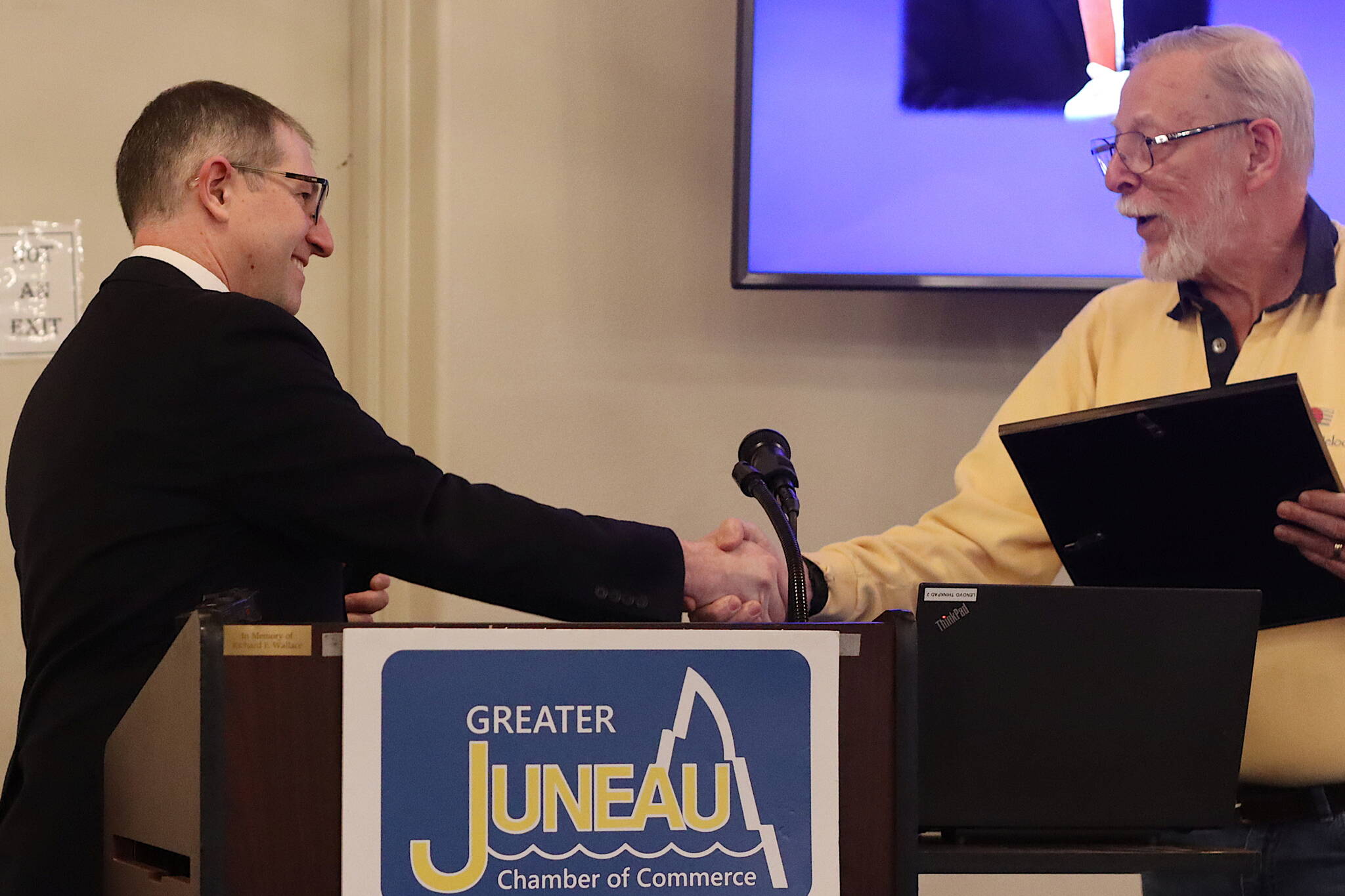The economic outlook isn’t as rosy as it seemed when the Alaska State Legislature wrapped up its business in May, but the political winds seem more favorable for tackling some of the short- and long-term challenges ranging from education to housing when lawmakers meet again next month, said Juneau State Sen. Jesse Kiehl during the Greater Juneau Chamber of Commerce’s weekly luncheon Thursday.
Last week’s formation of a Senate majority with nine Democrats and eight Republicans, plus the possibility of a similar House majority and preliminary indications Republican Gov. Mike Dunleavy may opt for a less-confrontational approach than his first years in office are reasons for optimism, Kiehl said during his noon-hour speech at the Moose Family Center.
“I think the benefit of having that kind of balance in the (Senate) caucus is that we’re going to have a hand on the steering wheel in the Alaska State Senate where it’s going to be putting aside the notion of what the Democrats want, what the Republicans want,” he said. “Everybody knows both sides got equally treated, and that will let them get back to focusing on the issues and focusing on their work.”
Plenty of partisan differences on key issues will continue to exist, but they’ll be discussed in a reasonable manner and with some broad general goals in common, Kiehl said.
“One of the things there was broad consensus on is it is past time to catch up on our school funding,” he said, a line that got the most applause during his speech. “There is a little dribble of money coming next year. It is a small piece of what inflation was the past six years. It doesn’t begin to touch what inflation is now. Our schools are way behind.”
Kiehl, a Democrat, also got applause for declaring “I believe the votes are there to return to an actual pension for employees of the state of Alaska.” He said Alaska is the only state without pensions, which is costly in money and manpower since new hires can get expertise for a job in another state with pensions.
“We can actually save money in that process,” he said.
The bipartisan Senate majority comes after years of a Republican majority, while the situation in the House remains uncertain. Three races remain undecided after certification — one due to a recount, two due to legal challenges about eligibility – that could determine if there is a bipartisan majority as happened the past several years or a Republican coalition.
Also uncertain is how Dunleavy will approach his second term after a decisive reelection win. Kiehl said the governor was more cooperative during the past year then his early period in office when massive budget cuts and other actions prompted an unsuccessful recall campaign.
But as stated by Dunleavy and numerous other lawmakers this year and others, Kiehl said oil prices — and production, to some extent — will determine the state’s literal and proverbial fortunes.
“Right now oil’s a couple dollars a barrel above avoiding a deficit,” he said, adding later “if oil stays in high $80s we’re not going to talk about broad-based taxes and we’ll wait to deal with that piece of long-term stability, (although) I don’t like it.”
Oil prices were about $104 when the session ended, allowing lawmakers to proclaim the state would be able to put money into savings and forward fund education. Kiehl said those ambitions are no longer so lofty, and lawmakers will have to confront the reality that “we still don’t have a sustainable long-term way to pay Alaska’s bills.”
He said he believes “there are some smart adjustments to resources taxes, especially oil” that are desirable, but he doesn’t expect the new Senate majority to embrace “extreme” ideas such as eliminating tax credits for oil companies altogether.
“There is no magic source of money,” he said. “We did that once this year with a war in Europe.”
But funding from somewhere will be needed to tackle issues frequently mentioned during the election such as housing and child care, Kiehl said. That will also involve questions such as “what can state government do to make sure your employees can come to work.”
In a similar vein, he said one problem right now is state employees who want to continue remote work after the COVID-19 pandemic, which is resulting in fewer such people working in Juneau.
“Work-from-home quickly turns into work from anywhere on Earth and we are seeing that,” he said, adding “it’s capital creep on steroids.
“I’m here asking for your help and your ideas on how we can get ahead of this. This is a major question for the next five to ten years for a significant aspect of our economy.”
• Contact reporter Mark Sabbatini at mark.sabbatini@juneauempire.com

